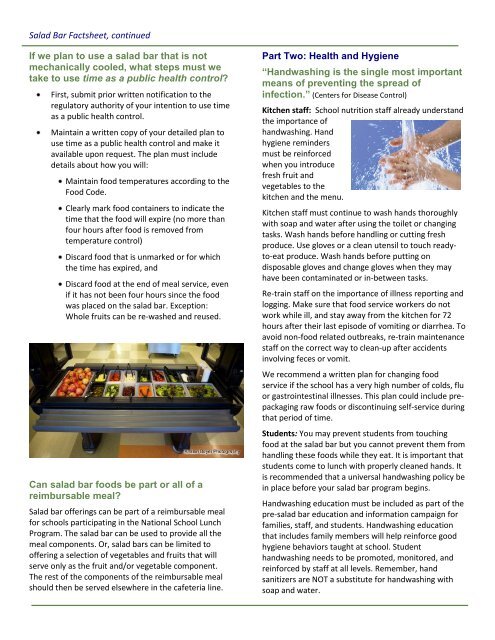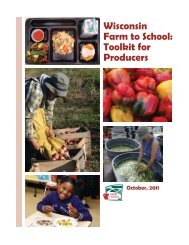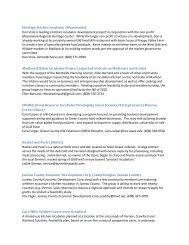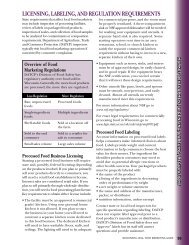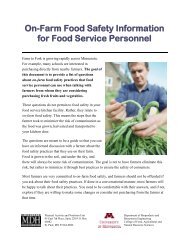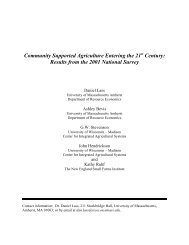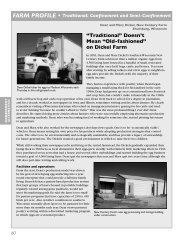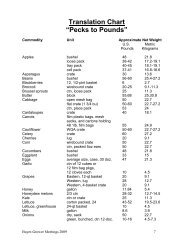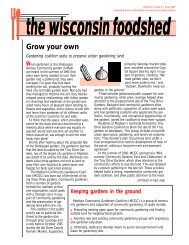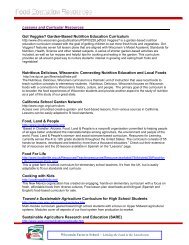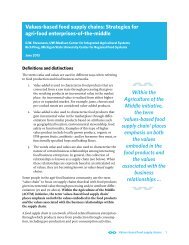A Field Guide To Salad Bars In Schools - Minnesota Department of ...
A Field Guide To Salad Bars In Schools - Minnesota Department of ...
A Field Guide To Salad Bars In Schools - Minnesota Department of ...
Create successful ePaper yourself
Turn your PDF publications into a flip-book with our unique Google optimized e-Paper software.
<strong>Salad</strong> Bar Factsheet, continued<br />
If we plan to use a salad bar that is not<br />
mechanically cooled, what steps must we<br />
take to use time as a public health control?<br />
First, submit prior written notification to the<br />
regulatory authority <strong>of</strong> your intention to use time<br />
as a public health control.<br />
Maintain a written copy <strong>of</strong> your detailed plan to<br />
use time as a public health control and make it<br />
available upon request. The plan must include<br />
details about how you will:<br />
Maintain food temperatures according to the<br />
Food Code.<br />
Clearly mark food containers to indicate the<br />
time that the food will expire (no more than<br />
four hours after food is removed from<br />
temperature control)<br />
Discard food that is unmarked or for which<br />
the time has expired, and<br />
Discard food at the end <strong>of</strong> meal service, even<br />
if it has not been four hours since the food<br />
was placed on the salad bar. Exception:<br />
Whole fruits can be re-washed and reused.<br />
Can salad bar foods be part or all <strong>of</strong> a<br />
reimbursable meal?<br />
<strong>Salad</strong> bar <strong>of</strong>ferings can be part <strong>of</strong> a reimbursable meal<br />
for schools participating in the National School Lunch<br />
Program. The salad bar can be used to provide all the<br />
meal components. Or, salad bars can be limited to<br />
<strong>of</strong>fering a selection <strong>of</strong> vegetables and fruits that will<br />
serve only as the fruit and/or vegetable component.<br />
The rest <strong>of</strong> the components <strong>of</strong> the reimbursable meal<br />
should then be served elsewhere in the cafeteria line.<br />
Part Two: Health and Hygiene<br />
“Handwashing is the single most important<br />
means <strong>of</strong> preventing the spread <strong>of</strong><br />
infection.” (Centers for Disease Control)<br />
Kitchen staff: School nutrition staff already understand<br />
the importance <strong>of</strong><br />
handwashing. Hand<br />
hygiene reminders<br />
must be reinforced<br />
when you introduce<br />
fresh fruit and<br />
vegetables to the<br />
kitchen and the menu.<br />
Kitchen staff must continue to wash hands thoroughly<br />
with soap and water after using the toilet or changing<br />
tasks. Wash hands before handling or cutting fresh<br />
produce. Use gloves or a clean utensil to touch readyto-eat<br />
produce. Wash hands before putting on<br />
disposable gloves and change gloves when they may<br />
have been contaminated or in-between tasks.<br />
Re-train staff on the importance <strong>of</strong> illness reporting and<br />
logging. Make sure that food service workers do not<br />
work while ill, and stay away from the kitchen for 72<br />
hours after their last episode <strong>of</strong> vomiting or diarrhea. <strong>To</strong><br />
avoid non-food related outbreaks, re-train maintenance<br />
staff on the correct way to clean-up after accidents<br />
involving feces or vomit.<br />
We recommend a written plan for changing food<br />
service if the school has a very high number <strong>of</strong> colds, flu<br />
or gastrointestinal illnesses. This plan could include prepackaging<br />
raw foods or discontinuing self-service during<br />
that period <strong>of</strong> time.<br />
Students: You may prevent students from touching<br />
food at the salad bar but you cannot prevent them from<br />
handling these foods while they eat. It is important that<br />
students come to lunch with properly cleaned hands. It<br />
is recommended that a universal handwashing policy be<br />
in place before your salad bar program begins.<br />
Handwashing education must be included as part <strong>of</strong> the<br />
pre-salad bar education and information campaign for<br />
families, staff, and students. Handwashing education<br />
that includes family members will help reinforce good<br />
hygiene behaviors taught at school. Student<br />
handwashing needs to be promoted, monitored, and<br />
reinforced by staff at all levels. Remember, hand<br />
sanitizers are NOT a substitute for handwashing with<br />
soap and water.


